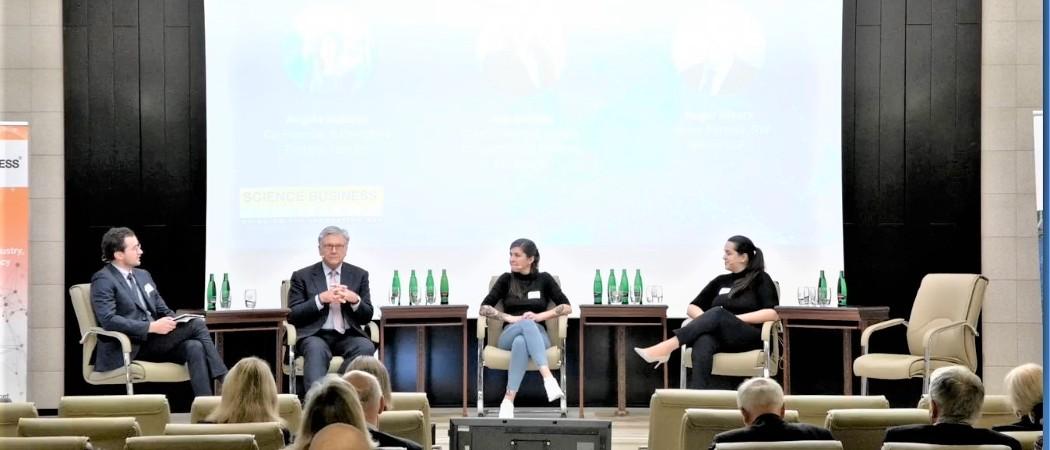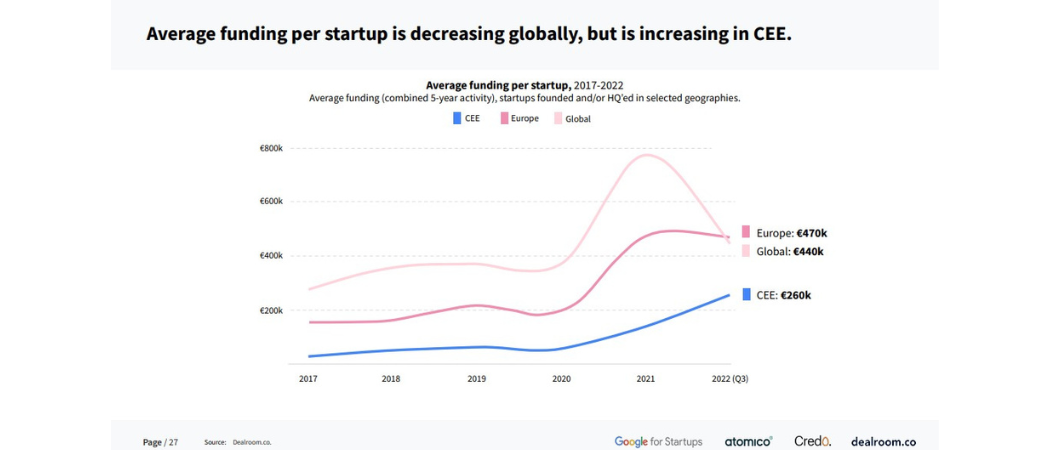The region’s entrepreneur scene is fast developing, but it still lags far behind western Europe in the number of companies and the amount of capital they attract

Roger Blears, corporate finance lawyer (centre left), Angela Ivanova, co-founder of Bulgarian start-up Lam’On (centre right) and Ana Barjasic, CEO of Connectology and EIC board member (far right), discuss the start-up scene in central and eastern Europe at a conference in Prague
There is still a notable gap in entrepreneurial success between central and eastern Europe and western Europe, both in the number of start-ups and the funding they receive. This is despite the fact that the region’s start-up scene is rapidly growing and investment is continuing to increase, in contrast to many other parts of the world.
The entrepreneurship gap was highlighted at the Science|Business conference on Brain Drain and Capacity Building in EU Widening countries, held in Prague on 10 November.
Ana Barjasic, CEO of Connectology and European Innovation Council board member, described the difference in entrepreneurial success between the east and west as stark.
Part of the reason is “historical baggage,” she said. “In some countries in the region, people don’t deal well with the definition of ‘entrepreneur.” People will ask, “Oh, you’re an entrepreneur, but who is your employer? “Sometimes people even think it is a criminal activity,” Barjasic said.
Risk aversion is also a key factor. “Entrepreneurs don’t start companies because there is too much risk, banks don’t lend money because there is too much risk, investors don’t invest because there is too much risk,” said Barjasic.
There are various European funding opportunities available to start-ups, but not everyone knows how they work or how to apply.
One success story is Lam’On, a Bulgarian company founded in 2018 that is producing a 100% biodegradable and fully compostable laminating film. The company won funding through the European Innovation Council’s accelerator grant.
Angela Ivanova, co-founder of Lam’On, said without European money, the start-up would never have got going. The founders went through various accelerators before getting the right funding, persevering through “sheer stubbornness”.
“Being a start-up in Bulgaria is just now starting to be a thing,” she said. “We did not at the time have any national programmes or opportunities to take advantage of, so we had to look to Europe.”
Outlier
But her success is an outlier, with central and eastern Europe lagging behind western Europe in winning funding. Barjasic said that the success rate of central and eastern European start-ups in getting funding is “dire”.
At the first EIC Accelerator cut-off in 2022, 74 companies were selected for funding worth a total of €382 million. Of those, just 12% were from the EU-13 Widening countries in central and eastern Europe. German companies made up 20% of the total, French companies 16%. It demonstrates how far the entrepreneurial funding gap is between the east and west.
Barjasic said it is important start-ups in central and eastern Europe are made more aware of Europe-wide funding initiatives and are encouraged to apply. Alongside her other roles she is the founder of Connectology, an entrepreneurship and investment agency, and thinks that intermediaries such as that have a duty to bridge the gap between start-ups and investment opportunities.
Despite the many challenges entrepreneurs in central and eastern Europe face in trying to get their companies off the ground, and the obvious success gap when compared to western European companies, there are positive signs.
For one, the region is one of the fastest growing in Europe in terms of enterprise value, according to a new report co-authored by Google for Startups, Atomico, Credo and Dealroom.co, with start-ups based there now valued at a total of around €190 billion.
That is four times higher than in 2017, while the total value of Europe-wide start-ups is around 3.1 times higher today than in 2017, at €3.4 trillion. In other words, the value of central and eastern European start-ups is rising faster than the European average.
Elsewhere, the number of unicorn start-ups that have reached valuation of $1 billion in central and eastern Europe has more than doubled since December 2020 to 44, including eight new ones this year.
Central and eastern Europe has also bucked the global trend in terms of the amount of funding start-ups are receiving. Globally and in Europe in general, start-ups got less funding in the past year, but it is the opposite for central and eastern Europe.

On a negative note, the report found 17% of start-ups from the region that raise €1 million in funding end up moving their headquarters abroad, to places such as the US or London.





 A unique international forum for public research organisations and companies to connect their external engagement with strategic interests around their R&D system.
A unique international forum for public research organisations and companies to connect their external engagement with strategic interests around their R&D system.